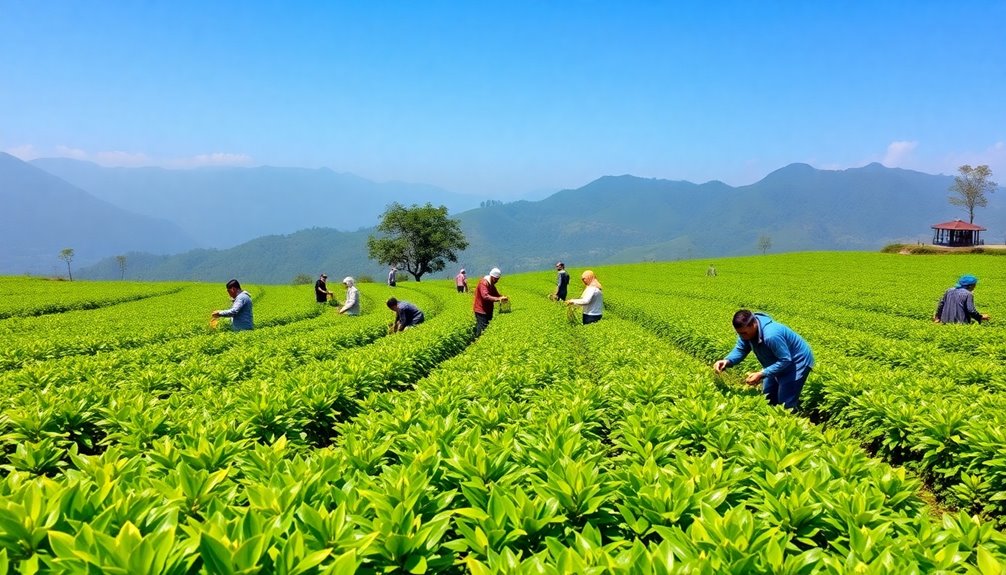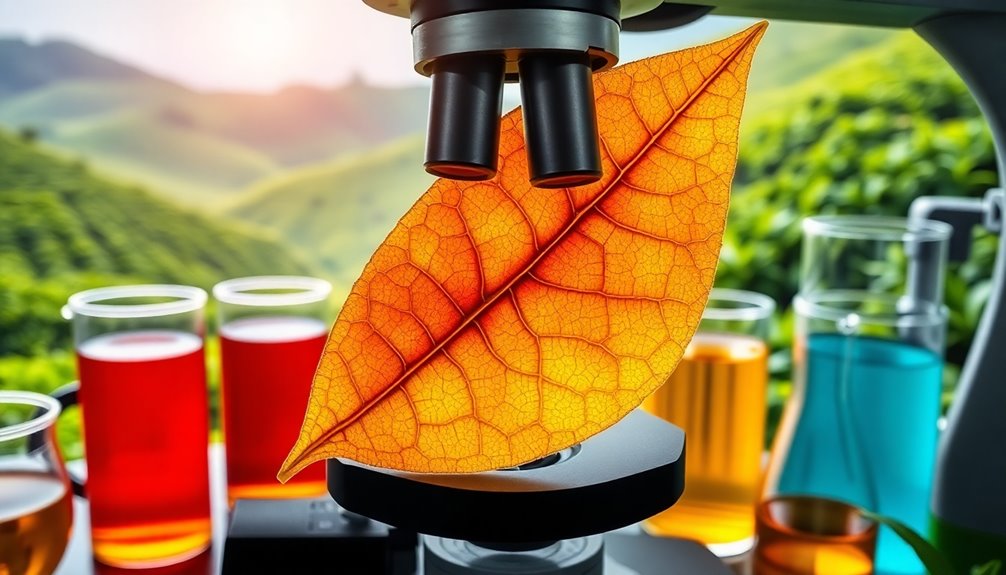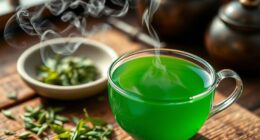Ethical sourcing is the future of tea because it prioritizes sustainability and fair labor practices. You'll find that consumers increasingly demand transparency about tea origins, with 71% willing to pay more for sustainably sourced products. By supporting fair wages and safe working conditions, ethical sourcing enhances both tea quality and farmers' livelihoods. It also encourages environmentally friendly practices, reduces carbon footprints, and promotes biodiversity. As companies adopt these values, they build trust with consumers and strengthen their brand reputation. If you explore further, you'll discover more about the impact of ethical sourcing on the tea industry.
Key Takeaways
- Ethical sourcing ensures fair wages and safe working conditions for tea farmers, enhancing their livelihoods and promoting community development.
- Growing consumer demand for transparency and sustainability drives the shift towards ethically sourced tea, with 71% willing to pay a premium.
- Certification schemes like Fair Trade and Organic enforce labor standards and reduce environmental impacts, promoting responsible farming practices.
- Ethical sourcing supports environmental conservation, reducing carbon footprints and encouraging biodiversity in tea cultivation.
- Cultural heritage and unique identities of tea regions are preserved through sustainable practices, fostering appreciation and connection among consumers.
Introduction

Ethical sourcing of tea has increasingly become a priority for both consumers and producers alike. As you explore the tea market, you'll notice a growing demand for transparency and sustainability.
Consumers like you're willing to pay a premium—about 71%—for sustainably sourced tea, reflecting a significant shift in purchasing behaviors. This change signals that you value fair wages for farmers and improved living conditions, which ultimately enhance the quality of the tea you enjoy.
When producers engage in ethical sourcing, they often establish direct relationships with family-owned tea estates, fostering community development initiatives like building schools for workers' families.
This commitment not only supports the local economy but also promotes environmental sustainability through organic farming methods and reduced reliance on harmful pesticides.
Moreover, the push for 100% traceability in tea sourcing builds consumer trust, aligning your purchasing decisions with your personal values around sustainability and ethical responsibility.
Ethical Sourcing in Tea Production
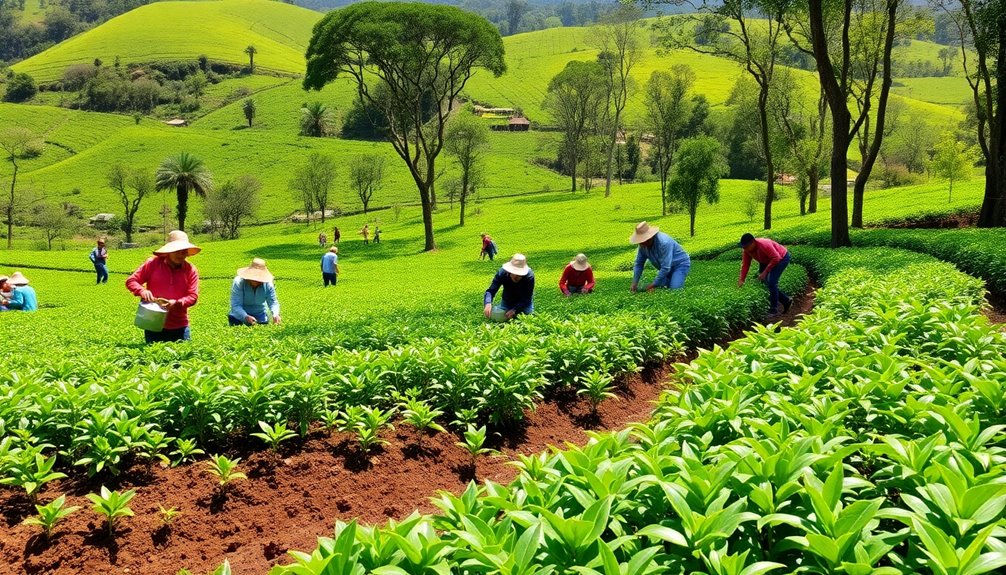
When it comes to tea production, sourcing practices directly impact both the quality of the tea and the livelihoods of the farmers. Ethical sourcing focuses on building direct relationships with farmers, ensuring they receive fair wages and improved living conditions. This not only enhances the quality of tea but also fosters community development.
As a consumer, you can support these practices by choosing brands that prioritize sustainable farming and transparency in their tea supply chains.
Certification schemes like Fair Trade and Organic enforce labor standards and minimize environmental impact, making it easier for you to identify ethically sourced products. With 71% of consumers valuing product traceability, implementing advanced technologies like blockchain enhances transparency and builds consumer trust. By knowing where your tea comes from, you can feel confident in your choices.
Moreover, ethical sourcing promotes sustainable practices that protect the environment and support local communities. By opting for tea brands committed to these principles, you contribute to a positive social impact while enjoying a high-quality beverage.
Ultimately, your choices in tea sourcing can drive a movement toward more responsible and sustainable tea production.
Consumer Preference for Ethical Sourcing
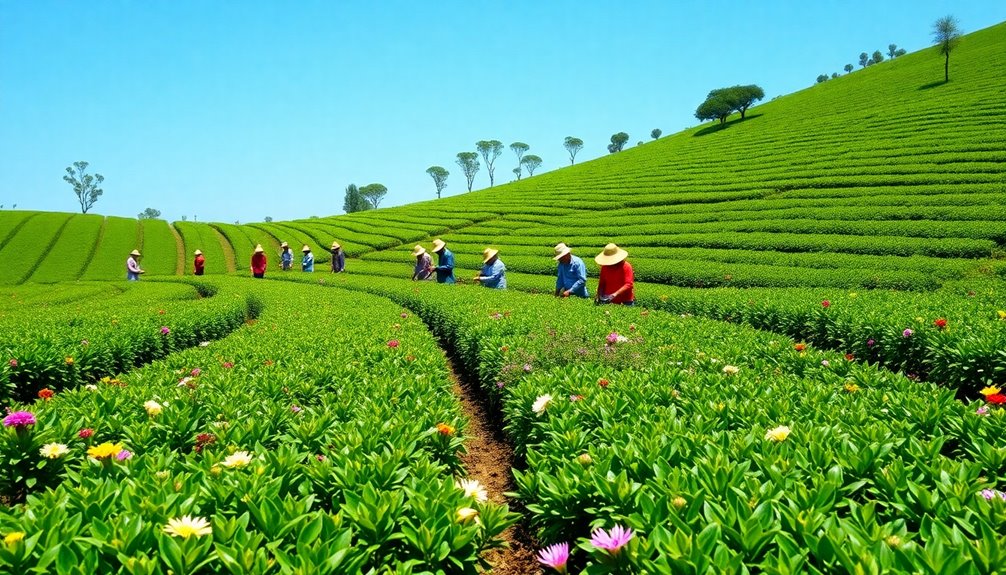
A growing number of consumers—71%, to be exact—place a high priority on knowing the origins of their tea and the ethical practices behind its production. This strong consumer preference for ethical sourcing reflects a shift towards valuing sustainable sourcing and transparency.
Many of you're now willing to pay a premium for products that align with your values, particularly those that prioritize fair labor practices and address environmental issues.
As awareness of these issues grows, tea producers who implement sustainable sourcing practices gain a competitive advantage. You're more likely to choose brands that demonstrate responsibility and commitment to ethical sourcing.
This shift not only builds trust between consumers and companies but also enhances brand reputation. Companies that prioritize transparency in their supply chains can effectively communicate their dedication to human rights and environmental stewardship.
In a market where consumers increasingly seek out responsible brands, ethical sourcing becomes more than just a trend; it's a business imperative.
Cultural Heritage of Tea Regions
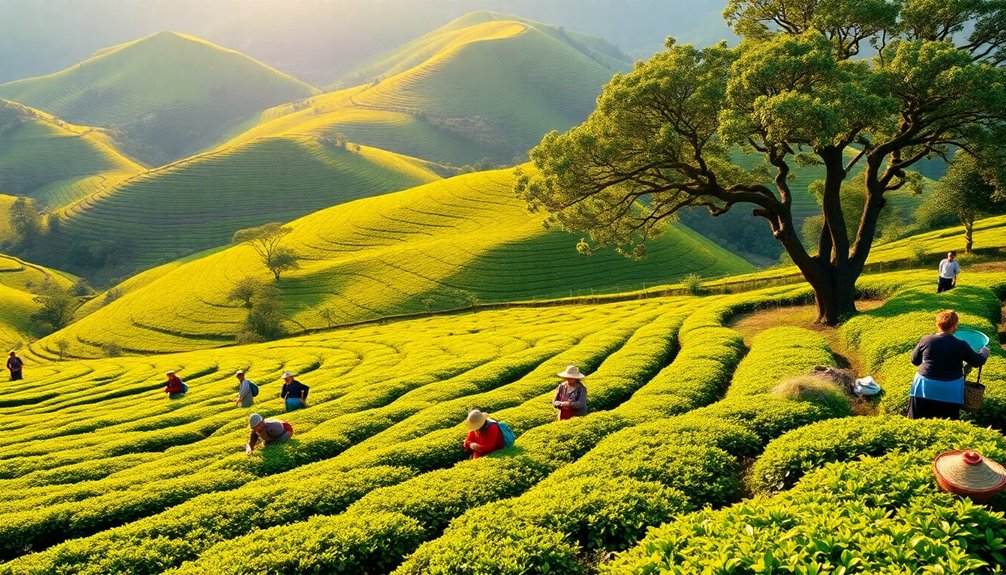
Understanding the cultural heritage of tea regions adds another layer to your appreciation for this beloved beverage. Each sip of tea reflects the unique identities and histories of the communities that cultivate it. For instance, Japan's traditional cultivation methods for matcha showcase local traditions, while Darjeeling's tea gardens serve as social spaces where community gatherings preserve cultural customs. Additionally, these gardens often align with ethical sourcing practices that support the livelihoods of local farmers. Recent studies suggest that incorporating sustainable farming practices can enhance the quality and flavor of tea, further connecting it to its roots. Furthermore, many herbal teas, such as chamomile and peppermint, are often cultivated using traditional farming techniques that respect the land and promote biodiversity.
In China, the Gongfu tea ceremony highlights the artistry behind tea preparation, deeply embedding tea drinking in cultural rituals. Regions like Assam and Sri Lanka maintain centuries-old farming techniques that focus on biodiversity and sustainable practices, which are vital for environmental health. By prioritizing these methods, tea producers not only honor their heritage but also promote ethical sourcing that benefits both the land and local communities.
As global appreciation for specialty teas grows, there's a revival of traditional cultivation practices. This trend allows you to enjoy a diverse array of tea varieties while supporting the cultural heritage of tea regions. Furthermore, the increasing demand for organic tea is pushing producers to adopt sustainable farming practices that protect both the environment and local traditions.
Labor Exploitation in Tea Farming
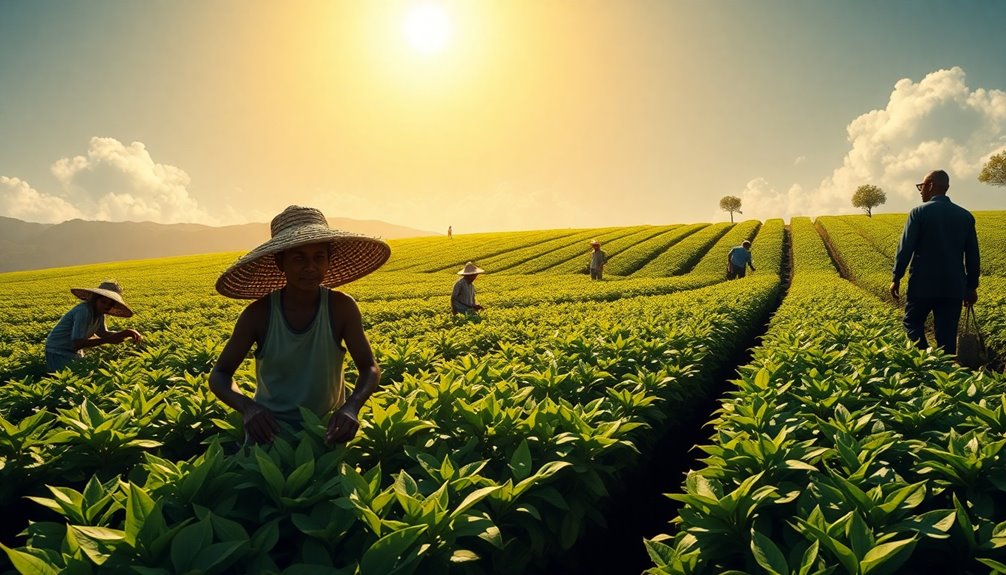
In many tea-producing regions, labor exploitation remains a critical issue that affects the livelihoods of countless workers. You might be surprised to learn that many tea workers earn less than a living wage, making it difficult for them to meet basic needs and support their families.
Unsafe working conditions are also prevalent, with reports showing that workers often handle harmful pesticides without adequate protective gear, leading to serious health risks.
Child labor is another significant concern, with hundreds of thousands of children working in tea fields instead of attending school. The absence of fair labor standards allows for long hours—sometimes exceeding 12 a day—without proper breaks or overtime compensation, further perpetuating the cycle of exploitation.
Certification programs like Fair Trade aim to combat labor exploitation by ensuring tea workers receive fair wages and work in safe environments. However, the costs associated with these certifications can pose challenges for small producers.
Practical Applications
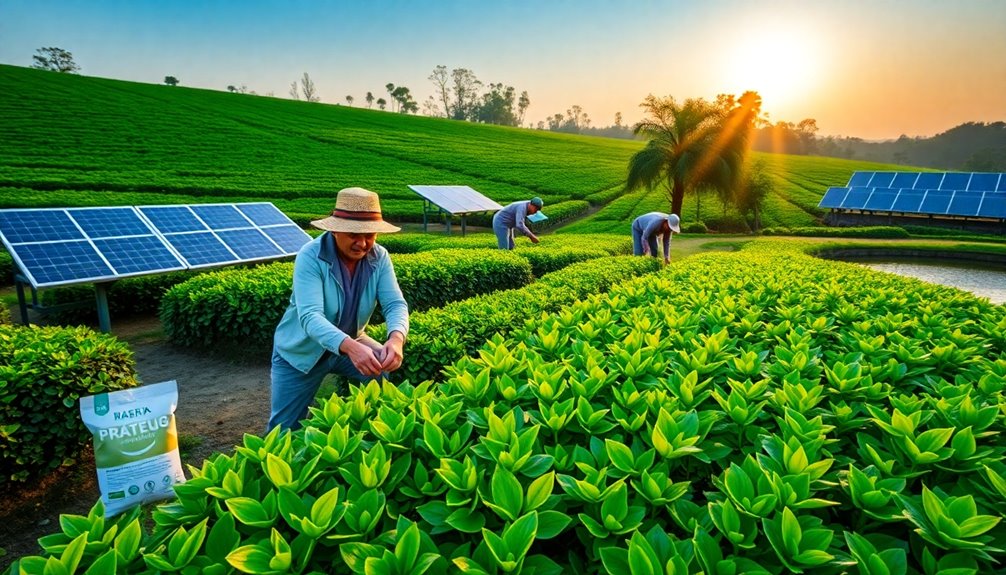
Through ethical sourcing, you can directly impact the tea industry by fostering relationships with family-owned estates. By prioritizing sustainable practices, you help ensure that tea production methods remain environmentally friendly.
When you support growers who hand-pluck tea leaves and focus on small batch production, you're not just enhancing premium quality; you're also promoting ethical treatment of laborers.
Investing in fair wages is crucial. When farmers receive a fair compensation, studies show they can improve yield and product quality significantly. This means that your choice to buy ethically sourced tea can lead to better flavors in your cup.
Moreover, traceability in sourcing is essential. By choosing brands committed to 100% traceability, you increase consumer trust and loyalty, knowing exactly where your tea comes from.
Additionally, ethical sourcing involves social responsibility initiatives. When you support companies that fund educational resources or build community facilities like nursery schools, you enhance the overall quality of life for those involved in tea production.
Together, these practical applications of ethical sourcing not only address environmental issues but also create a more equitable tea industry.
Conclusion
In conclusion, embracing ethical sourcing in tea production isn't just a trend; it's a vital step towards sustainability. By choosing ethically sourced tea, you're not only supporting fair labor practices but also preserving the rich cultural heritage of tea regions. As consumer preferences shift towards more responsible choices, the industry will evolve to meet these demands. Your choice matters—let's make sure it leads to a brighter, more equitable future for everyone involved in tea production.

